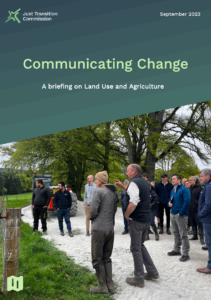To view the full content of the report, please download the PDF below.
Communicating Change

A Briefing on Land Use and Agriculture
In advance of the Scottish Government publishing their sectoral just transition plan for land use and agriculture, the Commission held a series of workshops and engagements in Grantown-on-Spey on the 17th and 18th May 2023.
The aim of the sessions was to agree advice for the Scottish Government on critical questions that will require addressing in the upcoming plan for the land use and agriculture sector. The focus of the engagement activity was to investigate the way major changes are or aren’t being communicated to land managers, communities and impacted groups whose way of life is going to change through land use changes as Scotland transitions to net zero.
The challenge
How are major expected changes being communicated to land managers, communities and impacted groups whose way of life is going to be changed by actions to contribute to net zero and deliver nature restoration? What is needed to reach, engage and communicate effectively with workers, producers, owners, communities and young people so that they understand the scale of the challenges, opportunities and changes underway and are able to respond and plan accordingly in a sector where long term investment is critical?
Key messages
1. Define the landing zone now.
Effective communication and meaningful engagement on a just transition for this sector will not be possible unless the key elements of what contributing to the Scottish Government’s net zero and nature restoration commitments means for this sector are honestly defined with far greater specificity. The case for each of these changes needs to be made, drawing on and communicating a wide range of evidence. The environmental objectives must be clearly specified, as well as the changes that will be required to achieve these, particularly those that will make some of today’s livelihoods unviable, including some that are deeply culturally embedded. Alongside these, new opportunities that will be created for sustainable business models need to be communicated with similar levels of evidence and detail. The ‘landing zone’ can be further defined by specifying how regulation, incentives, penalties and taxes will be used to phase out harmful practices; remove perverse subsidies; create new markets, and support sustainable practices, whilst ensuring policy actions systemically tackle inequalities. Given the multiple overlapping consultations supporting policy development that affect the land use and agriculture domain, the development of the Just Transition Plan, and the engagement work that supports it, provides a timely opportunity to pull many disparate threads together around agricultural reform, biodiversity and net zero targets, moorland management, land reform and the regulation of ecosystem markets.
2. Delays to difficult conversations are a just transition risk.
A sustained, strategically targeted programme of communication and engagement is required to achieve the necessary cultural shift and build consent for major changes so that impacted groups view themselves as an active part of the solution, empowered to plan for a net zero future. Currently many farmers describe a “communications vacuum”. Prolonged ambiguity and uncertainty encourage information gaps and misinformation to take hold, including key myths, blockers and talking points that encourage hostility to change and resistance to innovation and reskilling. These need to be recognised, analysed and addressed through communication from trusted figures within the community who can speak credibly to businesses and producers who report feeling demonised, disempowered, lacking agency and blamed for climate change despite compliance with previous arrangements. Being honest about the expected policy trade-offs on net zero, nature restoration, food production, the economy, and socio-cultural heritage is essential.
3. Build trust through material actions to tackle existing and emerging inequalities and demonstrate a more equitable sharing of costs and benefits.
The net zero and nature restoration transition will be perceived as unjust if the familiar inequalities that define the sector, most obviously in land ownership, are replicated or expanded, particularly via carbon and biodiversity markets. Ecosystem and biodiversity markets have the potential to contribute significantly towards net zero and nature recovery targets, whilst providing new income streams in the sector, but these markets will create winners and losers, with those most likely to lose out including tenants, crofters and local communities. Scope 3 emissions in the food supply chain will undoubtedly herald a new focus on climate and nature performance from farmers and land managers, and therefore there remain inherent risks to food producers in private carbon and biodiversity markets. Mechanisms need to be developed to ensure local communities, tenants and crofters are engaged in decision-making and can benefit from ecosystem markets. Further, trust must be built through a transition that safeguards the needs and interests of workers and communities by locking-in value to local communities, including formalising, regulating and maximising community benefit mechanisms so that these are demonstrably linked to areas of specific need for just transition delivery. Securing long lease tenancies, new models of shared ownership / management, and genuinely affordable rural housing will be crucial to provide land use opportunities for new entrants and help in the retention of people, workers and knowledge in local communities.